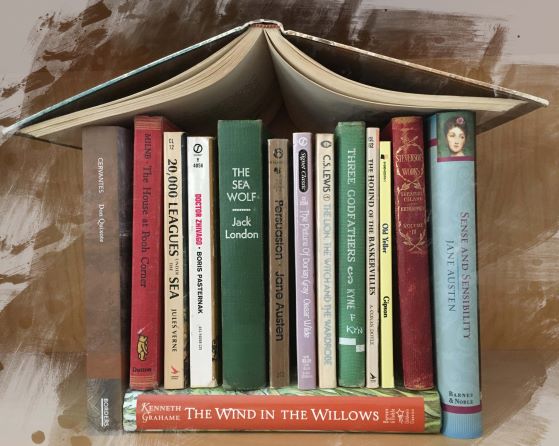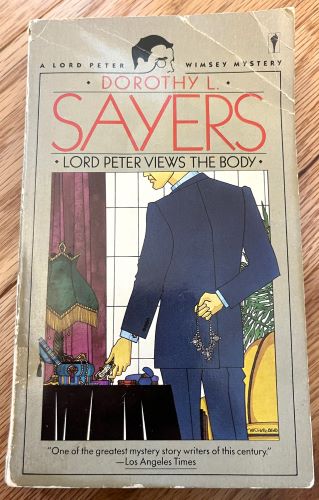
“Lord Peter Views the Body” ©1928 by Dorothy L. Sayers
This is a collection of twelve short stories about Lord Peter Wimsey.
Each story was a mystery that was deliciously solved and gave little glimpses into Lord Peter’s personality.
I really enjoyed the short story format.
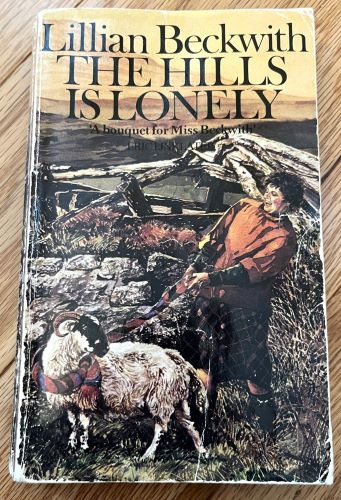
“The Hills is Lonely” ©1959 by Lillian Beckwith
Lillian Beckwith is a stout middle-aged retired school teacher who is advised by her doctor to find a place in the country that is quiet to rest and gain strength after a long illness. Her memoir of her time in the Hebrides Islands of Scotland may not have been as restful as her doctor would have liked, but it certainly made for delightful reading!
Lillian met a good many interesting characters and had several small adventures. Her stories offered a unique glimpse into a different culture and a different time. She treated her characters with respect and even with the funny tales never mocked them.
I think the weather alone would have first, worn anyone out and second, made them very resilient and tough!
“The Hate U Give” ©2017 by Angie Thomas
Starr is a teen who is living in two worlds. One in the black part of town where her family lives and her father owns a grocery store; the other in the white part of town where she and her brothers attend private school.
We are there the night Starr’s friend, Khalil, was shot and killed by a policeman right in front of her. The story is of the long-ranging consequences of this event for Starr and her communities.
We learn about the gangs that are active in Starr’s home neighborhood and we learn about the deep-seated privilege and prejudices in the white neighborhood.
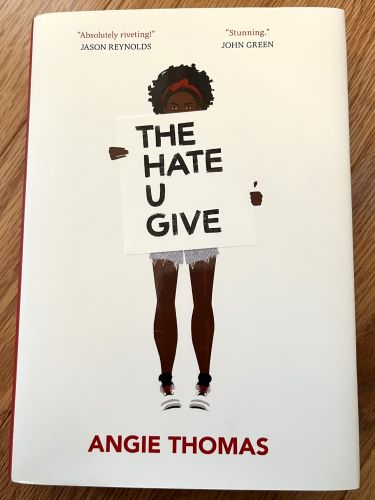
We see teens act like teens; bad language, sex, parties, and making choices for good or ill.
At first, Starr is too scared to say what she saw that night. As the investigation goes on, she does tell the police what happened. When she finds out the cop who killed Khalil won’t be held responsible, she finds the courage and her voice to stand up for Khalil and for all black people. She has to stand up to her best girlfriend and tell her how her words and attitudes are racist. She has to explain black culture to her white boyfriend. She stands up and shouts out that the policeman was in the wrong.
I liked that Starr was a realistic teen. One moment all grown and tough, the next needing reassurances and guidance from her parents. The interactions with her brothers seemed real as well.
I was challenged to remember there are always ways to tell a story that puts the blame on the victim. Khalil was not described as a 16-year-old who was supporting his grandma and sisters by the media; he was described as a drug dealer and thug.
This young adult novel, which has been banned over the years, is challenging, well written and really good.
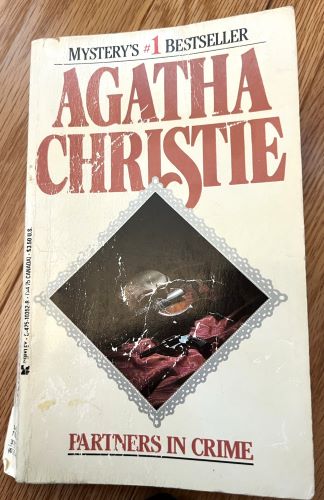
“Partners in Crime” ©1929 by Agatha Christie
Tommy and Tuppence are enlisted by Scotland Yard to impersonate a detective and his secretary at a detective agency. The original owner/detective has been arrested and is known to be part of a Russian Crime Ring. “The Yard” wants to keep the illusion of the detective agency being open to try and catch the rest of the gang, including the leader, #16.
While in the role of playing detective, they really do solve several local mysteries when clients come to them for help. They challenge themselves to investigate each new mystery by using the techniques of famous fictious detectives like Sherlock Holms.
Great fun!
“Things Fall Apart” ©1959 by Chinua Achebe
I know so little of the different African countries and culture. I found this story to be fascinating and heartbreaking.
The story is set in Nigeria in an Ibo tribe with the ‘strong man’ Okonkwo as the main character.
Ibo culture is complex and rich. Okonkwo works hard to be respected. He is wealthy with three wives and many children. He has a temper though and it gets him in trouble and he is banned from his village for seven years.
He takes his family to live in the village where his mother was from and where he still has Uncles. With hard work, he starts to build back some of his wealth.
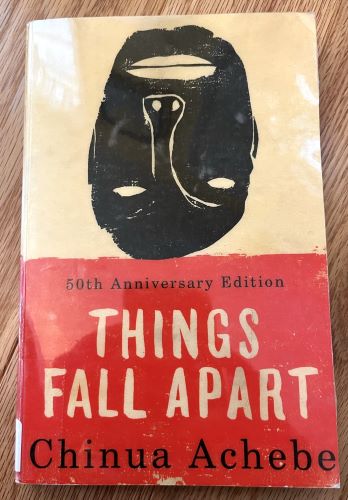
While he is in his mother’s village, white colonizers and missionaries arrive. This causes some chaos. Okonkwo’s oldest son becomes a Christian.
When Okonkwo’s seven-year banishment is up, he brings his family back home to his village with the hope he can once again become respected and help his village keep the colonizers and missionaries out. He leads a revolt and people are killed. The village leaders do not side with Okonkwo and he is sad and confused.
I have such conflicting feelings about what happened to Okonkwo’s tribe. It was hard to see the European missionaries and then European government totally destroy a way of life and belief system. Yet, the author went to college and then to the USA a to become a Professor of English, because of that sort of invasion. As a Christian, of course we want to spread God’s good news. Yet, so many (Christian or not) had other motives for taking indigenous people’s power from them.
So thought provoking. It has stuck with me for a long time.
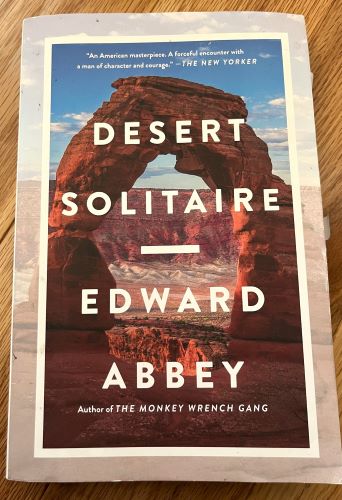
“Desert Solitaire” ©1968 by Edward Abbey
Edward Abbey’s descriptions of the desert in his memoir of his time working as a seasonal park ranger for the Arches National Monument in Utah are truly sublime. He so clearly describes his surroundings: the weather, the rocks, the sand, the animals and plants, the sunsets and clouds; I can almost smell the air and feel that dry heat.
I loved reading about his adventures with hiking and rafting. He sounds so reckless and he’s always drinking the water, yet he never mentions getting sick! Wild.
He is also a bit of a philosopher about all sorts of things and ideas. Maybe the loneliness of the desert brings the philosopher out in a person. Anyway, I will say when he randomly philosophizes about social problems, it can sound very dated and inappropriate by today’s ideas.
He makes some interesting points about “industrial tourism” (accessible to everyone, no one should have to leave their vehicle, or plan ahead for things like food and fuel) and who is actually benefitting (mostly oil companies). I am sure Arches National Monument looks very different today from the minimally developed roads and living conditions in the 1950’s-60’s.
I am going to leave you with this quote about wilderness from page 167:
“But the love of wilderness is more than a hunger for what is always beyond reach; it is also an expression of loyalty to the earth, the earth which bore us and sustains us, the only home we shall ever know, the only paradise we ever need – if only we had the eyes to see. Original sin, the true original sin, is the blind destruction for the sake of greed of this natural paradise which lies all around us – if only we were worthy of it.”
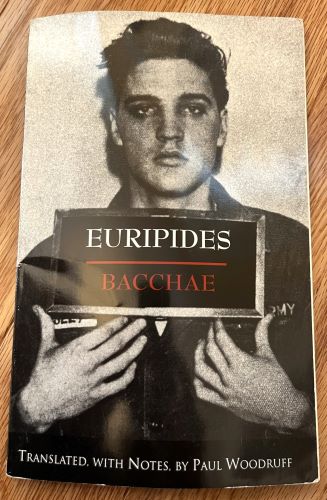
“Bacchae” ©somewhere around 405 BCE by Euripides
This is a Greek tragedy play set in Thebes.
Oh my gosh! What a wild story! It was well worth reading the long introduction and end notes. They really helped to fill in the culture and how the play would work onstage.
Dionysus is a god, one of Zeus’ sons by a human mother. He is also known as Bacchus and his women followers as ‘Bacchae’.
His mother’s sister and son (aunt and cousin) do not believe he is a god and blaspheme him.
Well, Dionysus cannot let that go, so he plans his revenge during the celebration of his cult by the Bacchae. This celebration by the women involves going into the wilderness to drink and dance to ecstasy.
During this celebration, Dionysus arrives in Thebes and confronts the King, Pentheus, his cousin. Dionysus convinces Pentheus to dress as a woman and spy on the Bacchae. Pentheus’ mother is one of the celebrants in the woods.
When Pentheus arrives, he is spotted. The women are crazed with drink and dancing and think he is a lion. His mother, with some others attack him and literally tear him apart.
As the messenger arrives in Thebes to share the news that the King is dead, Pentheus’ mother also arrives in celebration of her amazing victory over a wild beast, only to discover she is holding her son’s head.
The rest of the family are given various punishments (for blaspheming Dionysus) and sent away. Dionysus is victorious.
It is a plain reminder that humans do not change all that much. From appropriating a kingdom, to revenge, to wild parties and sex, to murder and the celebration of conquering your enemies, humans still do all those things and they write about them.
